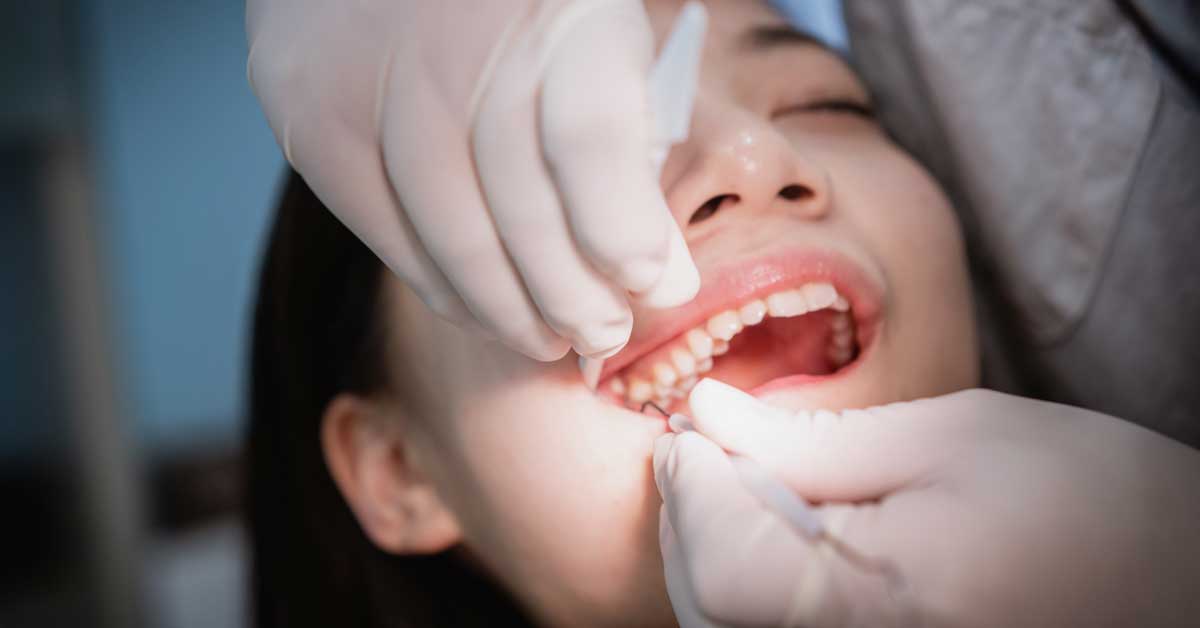Will Bad Breath Go away After Root Canal?
Bad breath, scientifically known as halitosis, can be a major source of embarrassment and self-consciousness. It can stem from various causes, including poor oral hygiene, gum disease, and untreated tooth decay. So, if you’re scheduled for a root canal procedure, you might be wondering: will it resolve your bad breath?
Endodontic therapy, commonly known as a root canal, aims to save severely infected or damaged teeth by removing the infected pulp, disinfecting the area, and sealing the root canal. While this procedure is effective in relieving pain and preventing further infection, its impact on bad breath may surprise you.
Bad breath can improve after a root canal if the bad breath was caused by an infection in the tooth that the root canal treated. However, if the bad breath was due to other factors such as poor oral hygiene, it may not completely go away with just a root canal. It is essential to maintain good oral hygiene practices to prevent bad breath regardless of dental procedures.
Key Highlights
-
Root canals can sometimes contribute to bad breath due to residual bacteria or poor oral hygiene.
-
Understanding the link between bad breath and dental health is crucial for preventing and managing halitosis.
-
The impact of a root canal on bad breath is influenced by factors such as pulpal necrosis and the thoroughness of the cleaning procedure.
-
Maintaining good oral hygiene practices after a root canal is essential for preventing bad breath and promoting oral health.
-
Medications, diet, and smoking can also affect bad breath after a root canal.
Understanding the Link Between Bad Breath and Dental Health
Bad breath, also known as halitosis, can be attributed to various factors, including poor oral hygiene, gum disease, and untreated tooth decay. One of the primary causes of bad breath is the presence of oral bacteria in the mouth. When leftover food particles in the mouth are broken down by these bacteria, foul-smelling sulfur compounds are produced, resulting in unpleasant breath.
It is important to understand that oral bacteria can thrive in conditions of poor oral hygiene, gum disease, or dry mouth. These factors create an environment that allows bacteria to multiply and produce the odor that is characteristic of bad breath. Even after a root canal procedure, bad breath may persist due to residual bacteria in the treated tooth or inadequate oral hygiene practices.
To address bad breath and maintain optimal dental health, it is crucial to adopt a comprehensive oral care routine. This routine should include regular brushing, flossing, and rinsing with mouthwash.
These practices help remove food particles, plaque, and bacteria, minimizing the risk of bad breath. Additionally, scheduling regular dental check-ups is essential for addressing any underlying dental issues that may contribute to bad breath.
By understanding the link between bad breath and dental health, you can take the necessary steps to prevent and manage halitosis, ensuring fresh breath and a healthy smile.
The Impact of Root Canals on Bad Breath
Root canals can sometimes contribute to bad breath, and it’s important to understand why. During a root canal procedure, infected tissues and bacteria are removed from the root canal system. This removal process can release foul-smelling sulfur compounds, which can lead to bad breath.
Pulpal necrosis, which refers to the death of the pulp tissue inside a tooth, can also have an impact on bad breath after a root canal. If bacteria start to multiply in the decaying pulp, it can cause a persistent odor.
Thorough cleaning during a root canal treatment is crucial for success. It not only removes bacteria and infected tissues but also reduces the risk of reinfection and promotes healing. Additionally, the proper cleaning ensures that the tooth can be effectively sealed, reducing the risk of further complications and increasing the chances of saving the tooth.
Maintaining Oral Hygiene After a Root Canal
After a root canal procedure, it is important to prioritize regular oral hygiene practices to ensure optimal oral health. By following these hygiene practices, you can prevent infections, maintain the health of your mouth, and prolong the success of the root canal treatment.
Proper Brushing and Flossing
One of the most important steps in maintaining oral hygiene after a root canal is to brush your teeth at least twice a day using a soft-bristled toothbrush and fluoride toothpaste. Be gentle and thorough, paying close attention to the treated tooth and the surrounding area.
Flossing is equally important and should be done at least once a day. Use dental floss or interdental brushes to clean between your teeth and remove any plaque or food particles that may be trapped.
The Power of Saliva
Saliva plays a pivotal role in maintaining oral hygiene post-root canal. It helps neutralize harmful bacteria, wash away food debris, and aids in remineralizing your teeth. To promote good salivary flow, stay hydrated by drinking plenty of water throughout the day. Chewing sugar-free gum can also stimulate saliva production, reducing the risk of bad breath.
Non-Alcoholic Mouthwash
A non-alcoholic mouthwash can be a valuable addition to your oral hygiene routine after a root canal. It can help kill bacteria, freshen your breath, and provide an extra layer of protection against oral infections. Look for a mouthwash specifically formulated for post-treatment use, and follow the instructions provided.
By maintaining proper oral hygiene practices, including brushing and flossing regularly, ensuring good salivary flow, and using non-alcoholic mouthwash, you can prevent the recurrence of bad breath and promote fresh breath post-root canal.
| Importance of Regular Oral Hygiene Practices | How to Prevent Bad Breath | The Role of Saliva in Maintaining Oral Hygiene |
|---|---|---|
| Prevents infections | Brush and floss regularly | Neutralizes harmful bacteria |
| Maintains oral health | Stay hydrated | Washes away food debris |
| Prolongs root canal treatment success | Use non-alcoholic mouthwash | Aids in remineralizing teeth |
The Role of Medications and Other Factors in Bad Breath After a Root Canal
Certain medications can contribute to bad breath after a root canal procedure. Some medications reduce saliva flow or cause a dry mouth, creating an environment where bacteria can thrive and produce an unpleasant odor. It’s essential to be aware of the potential side effects of medications and their impact on oral health.
Medications and Bad Breath
Medications that can cause dry mouth or reduce saliva flow include:
-
Antidepressants
-
Antihistamines
-
Decongestants
-
Pain medications
-
Diuretics
When saliva production decreases, it becomes easier for bacteria to multiply in the mouth, leading to bad breath. If you’re taking any of these medications and experiencing persistent bad breath after a root canal, consult with your dentist or healthcare provider to find strategies to manage dry mouth and improve oral hygiene.
Dietary Factors
The impact of diet on bad breath post-root canal should not be overlooked. Certain foods, such as garlic and onions, are notorious for causing breath odor due to their strong aromas. Even after a root canal, these foods can still contribute to bad breath. To minimize the occurrence of bad breath, it’s advisable to avoid or limit the consumption of these odor-causing foods.
Smoking and Bad Breath
Smoking is detrimental to oral health and can exacerbate bad breath following a root canal procedure. Cigarettes contain chemicals and toxins that can provoke gum inflammation and reduce saliva production. Saliva plays a crucial role in maintaining oral hygiene and eliminating bacteria that cause bad breath. Therefore, quitting smoking or reducing tobacco use is crucial for improving oral health and minimizing bad breath.
The Importance of Regular Dental Check-ups and Cleanings
Regular dental check-ups and cleanings play a vital role in maintaining your overall oral health. These appointments not only help keep your teeth and gums in great condition but also address common concerns like bad breath. By prioritizing regular dental care, you can enjoy a healthier mouth and fresher breath.
During dental check-ups, your dentist will thoroughly examine your teeth, gums, and overall oral cavity. This allows them to detect any early signs of dental problems such as tooth decay, gum disease, or infections. By identifying and treating these issues early on, you can prevent them from progressing and causing more significant problems.
Professional dental cleanings are crucial for removing plaque and tartar buildup from your teeth. Even with excellent oral hygiene practices at home, some areas of your mouth can be difficult to reach and clean thoroughly. Dental hygienists use specialized tools to remove plaque and tartar, reducing the risk of tooth decay and gum disease.
“Regular dental check-ups and cleanings are essential for maintaining optimal oral health and preventing potential dental problems. These appointments help address bad breath and ensure your smile stays healthy and fresh.”
Addressing bad breath is another significant benefit of regular dental check-ups and cleanings. Bad breath, or halitosis, can be caused by various factors, including poor oral hygiene, gum disease, and untreated dental issues. By removing plaque, tartar, and bacteria from your teeth and gums, dental cleanings effectively help freshen your breath.
In addition to regular dental care, there are also several remedies you can try to address bad breath. Mouthwashes containing antibacterial properties can help kill odor-causing bacteria in your mouth. Natural remedies such as chewing mint leaves, using tongue scrapers, or maintaining good oral hygiene practices like brushing and flossing after meals can also contribute to fresher breath.
By combining good oral hygiene practices, regular dental check-ups, professional cleanings, and exploring various remedies, you can effectively address bad breath and enjoy improved oral health. Remember, maintaining a healthy mouth is not only crucial for your overall well-being but also enhances your confidence in social interactions.
| Benefits of Regular Dental Check-ups and Cleanings |
|---|
| Early detection and prevention of dental problems |
| Removal of plaque and tartar buildup |
| Fresher breath |
| Improved oral hygiene |
| Enhanced confidence in social interactions |
The Psychological Impact of Bad Breath
Bad breath can have a significant psychological impact on self-esteem. Individuals with chronic halitosis may experience social anxiety and decreased confidence in social interactions and relationships. This can lead to feelings of embarrassment, self-consciousness, and even isolation.
Improving dental hygiene and seeking professional help can alleviate the psychological burden, boosting self-esteem and overall well-being. By maintaining regular oral care habits and addressing the underlying causes of bad breath, individuals can regain their confidence and enjoy improved quality of life.
Conclusion
Maintaining oral hygiene after a root canal is crucial for long-term dental health. Regular brushing, flossing, and rinsing with mouthwash help prevent future infections and prolong the success of the root canal treatment. By prioritizing oral hygiene habits and seeking professional care, individuals can enjoy a healthy and pain-free smile, fresh breath, and improved self-confidence.
Regular dental check-ups and cleanings play a vital role in detecting and preventing dental problems. These appointments allow dentists to remove plaque and tartar buildup, reducing the risk of tooth decay and gum disease. By attending regular check-ups, individuals can ensure overall oral health and address any concerns, including bad breath, promptly.
Remember, oral hygiene practices specific to post-root canal care require attention. Following your dentist’s advice on proper brushing techniques, flossing, and selecting the right mouthwash is essential. Your dentist may also recommend natural remedies or special mouthwashes to further enhance oral hygiene.
Frequently Asked Questions
A root canal can improve bad breath if it’s caused by the infection the procedure treats. However, for issues unrelated to tooth infection, such as poor oral hygiene, a root canal alone may not resolve bad breath.
Residual bacteria, poor oral hygiene, dry mouth, diet, smoking, and certain medications can contribute to bad breath after a root canal.
Regular dental check-ups and cleanings are recommended every six months, or as advised by your dentist, to prevent dental problems and manage bad breath effectively.
Consult with your dentist to determine the underlying cause of your bad breath. They may recommend additional treatments or adjustments to your oral hygiene routine.
Follow your dentist’s advice on proper brushing and flossing techniques, and consider using a mouthwash formulated for post-treatment care to enhance oral hygiene and prevent bad breath.
Root Canal In Miami, FL
Don’t delay in restoring your dental health and comfort. Schedule a consultation with our endodontic specialists today and learn how a Root Canal treatment can relieve your pain and save your tooth. Experience the relief and renewed confidence that comes from taking care of your smile.



